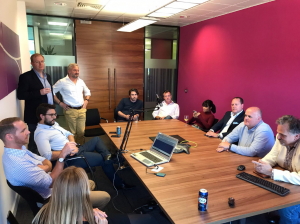The way that blockchain and digital currencies are already revolutionising industries as diverse as recycling, energy, financial services and the law was explained at Bristol’s first Crypto Curry Club.
Hosted by the Bristol office of law firm Thrings, the event brought together some of the leading minds in the field to discuss the future of money.
The clubs were launched in London a year ago to bring together entrepreneurs, developers and blockchain community members to talk about the latest trends at the intersection between technology, finance, and society.
Its first gathering in Bristol attracted a high-level group made up of G20 speakers, former Facebook innovators, environmental and energy businesses.
The group looked at how through crypto currencies such as Bitcoin, blockchain can challenge traditional banking and promoting ‘real financial inclusion’.
Libra, the digital currency being developed by Facebook, was put under the spotlight, with concerns around the centralised nature of the currency and privacy.
Also addressed was blockchain’s role in the circular economy, smart and demand-led energy systems and the future of ‘smart contracts’ in supply chains.
Among the speakers was Areiel Wolanow, founder of financial consultancy Finserv Experts, adviser to the UK’s Parliamentary Group on Blockchain and G20 speaker, who is working on a blockchain project bringing micro-insurance against natural disasters to Indonesia.

He explained how the cost of providing the insurance service, including claims investigations and the delivery of pay-outs to disaster areas, made premiums incredibly high for ordinary people. Finserv Expert’s solution uses blockchain to automate pay-outs to policyholders in areas which have been officially confirmed to have been hit by a natural disaster.
Steve Cochrane of London-based cyber security agency Psyphr said: “If Libra is going to give you something which you don’t have, and you’re willing to give up a level of privacy in return, then it might be an acceptable price to pay.”
Tony McGurk, CEO of CryptoCycle, which is using blockchain in the environmental sector, explained how the business is building a deposit-return scheme called Reward4Waste that uses blockchain to secure the value of the bottle as it’s recycled while eliminating all fraud.”
The technology, which provides end-to-end tracking, could be extended to other areas of domestic waste to reward recycling.
The firm has also helping tackle the huge problem of nappy recycling.
“A disposable nappy takes 200-500 years to breakdown in the soil and local authorities hate them,” added Tony McGurk.
“Companies are now beginning to build plants that can recycle nappies. I call it ‘profit from poo’. We’re applying the same tracking technology to incentivise people to put their nappies into special recycling containers.”
Neil Pennington, a strategic advisor to Energy Web Foundation, the non-profit organisation focused on accelerating blockchain technology across the energy sector, spoke about blockchain’s application for electrical vehicle charging within smart energy systems.
“The biggest issue is around having interoperability – a single unique digital identity in this space. In other words, making a charging point or a vehicle a unique and universally recognised asset that can be interoperable across platforms,” he said.
There was also some discussion around tokenisation of assets – using blockchain tokens to digitally represents real tradable assets.
Rob Gaskell, CEO of 2030 Asset Management said: “I know through demand for some of our products that huge amounts of property and real estate will move to a tokenised market over the next year or so.” 
The legal industry is also set to be affected by the technology in more ways than one. Dave Karney, head of digital assets at online payments giant Worldline, highlighted the potential of ‘smart contracts’ as a supply chain solution.
Blockchain-coded contracts are already being used to track supply chains in agriculture, healthcare and environmentally responsible businesses, for private client matters and even to allow fractional ownership of assets such as art or real estate.
Thrings recently formed blockchain team led by associate Will Foulkes to guide clients through the technological and legal developments and opportunities associated with blockchain. It forms part of the firm’s wider technology team.
Will, pictured, said: “Smart contracts are the future and they will be a key part of how companies transact, how loans are provided and drawn down, how buildings are built, people paid and how you can make sure what’s inside a building is what you paid for.
“Lawyers are going to need to have a very good idea of how these smart contracts work, of how they’re put together and what the code is that sits behind them.
“By embracing this rapidly evolving technology ahead of its widespread use and teaching our lawyers how to code, Thrings is fast becoming a trusted advisor to businesses looking to navigate the uncertainty around the technology’s use, as well as those seeking to clinch the opportunities it presents.
“The Crypto Curry Club is a fantastic event, bringing together some of the best minds in the field. We are delighted to be supporting the event’s founder Erica Stanford and the incredibly collaborative blockchain community who are working on innovations that could change the world – for the better.”
Crypto Curry Club will return to Thrings’ Bristol office on November 29.
Elaborating on the inaugural Bristol meeting’s topics and best-use cases, a group of experts stayed on to participate in Thrings’ first Blockchain Podcast, available here






























